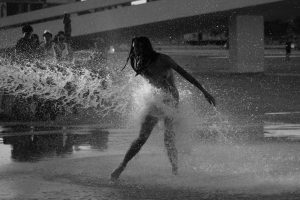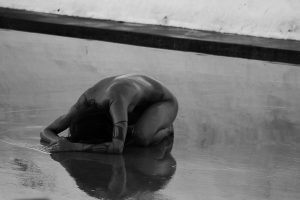by Maria Eugenia Matricardi
A white butterfly flies over the humid foam that floats next to the waterfall. A mere drop could exterminate it or destroy its fragile silk wings. It risks itself as if enchanted, as carbonized insects risk themselves flying around the incantation of light emanating from a bulb.
This was the image that affected me: my nude body encountering an intense flux of water being washed from a truck hose. The distinctness of the image is not translatable in words. Words trail us towards the labyrinths of doubt. This is a delirious lucidity that embodied desires with the cruelty they imply. There is no submission, there is surrender. How far can we go in longing for a sensation? We do not know. I believe we can go very far. It started as something closer to an intuition, to something that I did not know: a practically intact image, a sensation that remained consistent until it was performed. There was not much to be said.
The only thing to be done was to surf the sensation, to assume the image as an experience and trust the force it conjured. To dive into the sensation until it was gone, or else to be-sensation and to be within the sensation as in a state that traverses the fullbody [sic]. And, which abandons the organism.
 A naked body, a water truck loaded with twenty thousand litters of water, two men to hold the hose, a visually clean architectural structure, at the of the afternoon, the sunset. Water, light, body. Dense water, that is flexible, that embraces existing forms, that mold itself and flows in ways that can deform and perforate the toughest surfaces.
A naked body, a water truck loaded with twenty thousand litters of water, two men to hold the hose, a visually clean architectural structure, at the of the afternoon, the sunset. Water, light, body. Dense water, that is flexible, that embraces existing forms, that mold itself and flows in ways that can deform and perforate the toughest surfaces.
I take out my cloth, I place myself naked with my back facing the external museum’s wall. I ask the men to turn the pressure in the hose to its highest level. The body intimates the water flux and establishes a place of combat. The water outflow compresses, deforms the flesh: surface against surface, a space of incidence upon which things happen in their materiality, as a function in relation of their limit in relation to the space. Contraposition: to being against as a way of engendering with-tact (com-tato), creating adherence zones. Body against the concept. Concept against Concept. Body against body. The vulnerability of allowing it to flow, to let the body vibrate against the organism. Water skin, flux skin, air skin, almost nothing, a puddle on the ground.’
The body incurs, leaks, throws itself, gets exposed, flows. it gets captured by the gush pressure and it is pushed against what is tough, what is concrete, what is reality: the undeniable limit imposing itself as a material barrier. It acts at the edges, it proposed unedges.
The violence of this action has nothing to do with the violence of war or of the police. In both cases, the violence trespasses the body, the nervous system, the flesh. However, violence in this case makes you plunge into the sensation, opening the path towards the knowledge of other places of experimentation, those places where life does not depend on organisms, and exactly because of that they go beyond the limits of what is represented, or lived. War or police violence, in contrast ,steals your subjectivity, operates by fear and constraint, determining and localizing those sites where sensations dwell, by there stanching the potency of the senses. If I throw myself into the unstable storm is to experience the body vibration, not to feel the organism.
The violent canon water flux disrupts protests, shuts the anger of prisoners in a ritual of humiliation, it controls. It is brought into action with the spiraling cruelty of power, without the horror of its images, with the sensation that makes control present at different levels, the agency of an imminent power over the body, which deforms the flesh. This is a recurring fact; however, it is updated in action as a singular événement. I opted for scarce elements, for letting it happen with the strength of its own reverberation, without visual or symbolic pollution. Brutality does not nullify the beauty.
I prefer when the body speaks without speaking. It screams silently making life reverberate on the skin surface. It suspends habitus, it rips clothes, it understands the body as a body, just that, all of that… there are many forms of nudity. It can or not be de-territorialized, it can be razor on the flesh, pornographic, sacred, subtle, a genesis ritual, a transvestite on the road, a gesture in the world, it does not matter: may the body be a battlefield.
When action is not differentiated from life, when it is an aestheticized gesture, intentional and poetical, but also pregnant of the unusual, of body vibratility, of what simply goes by…therefore, vulnerable, I ask myself: what can be preserved?
The water breaks the pain that inhabits the skin. Water- skin that flows. The gush-flux washes the lucidity of the body. Melting. Density. Jellyfish. Absorption. I do not absorb nothing, things absorb me.
What can be said when the body abandons the organism, and sensations emerge that exceed sensations ever felt? Wouldn’t that be a possibility of creating affections, new locus of sensation that may un-determine our ways of understanding?
If the action is based on what is lived, on daily life, if it wanders through opinions, it is not because it aimed at a spectacle. This is so to open the inroads for the ordinary forces of daily life to become impregnated with sensations. As to capture the force of sensation, it is necessary to let it permeate oneself, to make it visible. It is necessary to be frail, as to open these paths, and to be strong enough to bear it, because not always the best sensation in action is the not the most pleasant. Quite frequently this is exactly the opposite.
To take distance from what is easy. There is effort, there is weakness, there is diving into one’s own shadows to find lightness. The body has its own wisdom, it knows through flavor, it experiences with a fullbody what is lost and isolated in the abyss of sensations that escape from oneself. The body straddles paths without leaving trails, it activates its own unsettling agents.
 The impact of the twenty thousand liters of water did not drown me anymore. I did not defend myself, either. I surrendered. The pain that mobilized the skin and the organs dissipated as exhaustive strength. The body surrendered to the ground, without effort, with no more strength. Someone pulled me up, transported my flesh to the museum’s toilette. I looked at the mirror and did not recognize the reflection. What I saw was a carcass there reflected. The body had abandoned the organism, which was revealed by the flesh, which was altogether gone with the last drops falling from the water truck’s hose. I did not recognize myself, I was not there anymore. The form reflected on the mirror was not mine. Emptiness. Are sensations constituted of emptiness? Or was it a being empty of sensation? I came back to the ulterior form of the egg, with no vectors, no directions, no bones, nor layers, there where form does not matter and knowledge looses its breath. Diving into the egg, a possible place from where inorganic life is born, breaking through the fragile shell of the organism. At the unedges of vagueness.
The impact of the twenty thousand liters of water did not drown me anymore. I did not defend myself, either. I surrendered. The pain that mobilized the skin and the organs dissipated as exhaustive strength. The body surrendered to the ground, without effort, with no more strength. Someone pulled me up, transported my flesh to the museum’s toilette. I looked at the mirror and did not recognize the reflection. What I saw was a carcass there reflected. The body had abandoned the organism, which was revealed by the flesh, which was altogether gone with the last drops falling from the water truck’s hose. I did not recognize myself, I was not there anymore. The form reflected on the mirror was not mine. Emptiness. Are sensations constituted of emptiness? Or was it a being empty of sensation? I came back to the ulterior form of the egg, with no vectors, no directions, no bones, nor layers, there where form does not matter and knowledge looses its breath. Diving into the egg, a possible place from where inorganic life is born, breaking through the fragile shell of the organism. At the unedges of vagueness.
Translation: Matheus Opa, reviewed by Sonia Corrêa
Action: Body against Concept
Maria Eugênia Matricardi
Pictures: Thalita Perfeito
Materials: water truck, twenty thousand liters of water, naked body
Action made by: Maria Eugênia Matricardi, Diego Azambuja and Rogério Luiz.
Production: Corpos Informáticos
Place: external area of the Museu da República, Brasília, Brazil.
Event: Performance, corpo, política.
2013.
Site: http://mariaeugeniamatricardi.com/
